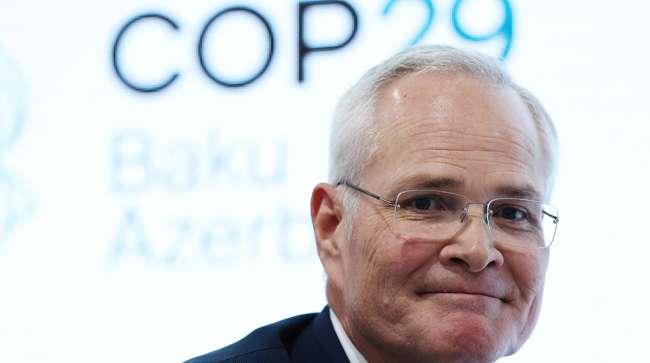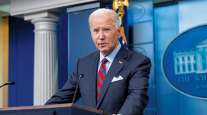Bloomberg News
Exxon CEO Urges Trump to Stick With Paris Climate Pact

[Stay on top of transportation news: Get TTNews in your inbox.]
The chief executive of Exxon Mobil Corp. on Nov. 12 discouraged President-elect Donald Trump from withdrawing the U.S. from the landmark Paris climate pact, arguing that would mean forfeiting a chance to push for “common sense” carbon-cutting policy on the world stage.
“The way you influence things is to participate, not to exit,” Darren Woods said in an interview during the U.N.’s COP29 climate summit in Azerbaijan.
Just as the incoming administration is seeking to drive “common sense” in domestic policy, Woods said, it can “try to drive a similar level of common sense” internationally that balances emission reductions with the need for affordable energy.
Trump has promised to once again withdraw from the Paris Agreement on the campaign trail, reprising the earlier exodus he led his first term in the White House. Exxon Mobil, the top U.S. oil producer, was among the companies that unsuccessfully discouraged the departure in 2017.
Today in Baku, The United States, People’s Republic of China, and Azerbaijan convened a Summit to accelerate action to cut emissions of methane and other non-CO2 greenhouse gases. The Summit focused on key actions to reduce near-term warming and keep a goal of limiting global… pic.twitter.com/pqa0JyYUuf — COP29 Azerbaijan (@COP29_AZ) November 12, 2024
Woods’ comments underscore emerging policy clashes between the oil industry and the incoming president, who has vowed to “drill, baby, drill” and unleash American energy might, even if it’s at odds with producers’ focus on shareholder returns. Trump has signaled he’ll ease some regulations that may be essential for the industry’s social license to operate and its access to foreign markets, where regulators are increasingly focused on the carbon intensity of imported fuels.
And the Republican has vowed to take aim at what he calls Washington’s “green new scam,” setting up potential attacks on energy subsidies under the 2022 Inflation Reduction Act. Some of those incentives — including tax credits for capturing carbon, producing hydrogen and making sustainable aviation fuel — are particularly popular with oil companies.
“We think the IRA makes sense,” Woods told the Bloomberg Zero podcast at COP29. Where policies around the world often “pick winners and losers,” Woods said the IRA stands out for how some of its credits focus on the goal of lowering carbon intensity instead. “The advantage of the IRA was it focused on outcomes,” thereby allowing companies and the market to figure out how best to meet them, he said.
Want more news? Listen to today's daily briefing above or go here for more info
The Treasury Department is still writing guidelines for what projects qualify for an IRA tax credit that rewards the production of low-carbon hydrogen production. Exxon Mobil has ambitions to generate hydrogen from a facility in Texas using natural gas the company says would have lower methane intensity while employing technology to capture any carbon emissions. Getting access to the hydrogen production credit is essential for justifying the investment, Woods said.
Woods said government policies are critical to encouraging investment in the energy transition, where lower-emission technologies often come with a green premium.
“If you look at the drives to invest in the transition, there aren’t any market forces or incentives to invest, which is why government policy is either mandating or subsidizing,” he said. “To go from the system that we have today to a less-carbon-intensive system is going to require money, and it’s going to be more expensive.”
“What the world needs is a transition that companies can make money on and generate returns on,” he said. “Otherwise, you’re not going to drive the investment that you need.”




